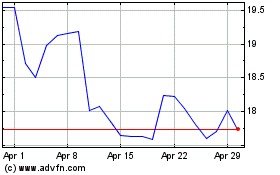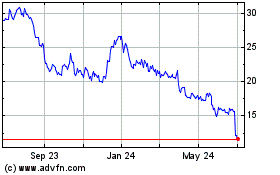By Sara Randazzo
CLEVELAND -- Plaintiffs' lawyers for cities and counties are
demanding more money from major drug distributors, holding up a
wide-ranging settlement of opioid litigation after hours of
negotiations failed to result in a deal.
Top health-care executives and legions of lawyers descended on
the federal courthouse here Friday for settlement talks under the
guidance of U.S. District Judge Dan Polster, who called all sides
to his courtroom in a last-chance attempt to strike a settlement
ahead of a Monday trial.
Three drug distributors, AmerisourceBergen Corp., Cardinal
Health Inc. and McKesson Corp., have offered to pay $18 billion
over 18 years to resolve lawsuits filed by state and local
governments seeking to blame them for helping fuel the opioid
crisis, state attorneys general said Friday.
That amount isn't enough for cities and counties that have cases
in front of Judge Polster, Paul Hanly, a lead lawyer for the
municipalities, said outside of the judge's courtroom Friday. Mr.
Hanly said his group is pushing for more money to be paid out over
a shorter time.
North Carolina Attorney General Josh Stein, speaking Friday
evening alongside three other attorneys general, said they support
a settlement with five companies valued at $48 billion and are
"deeply disappointed the cities and counties refused to go along
with that deal."
In addition to the distributors' cash contribution, the proposed
deal includes $4 billion from pharmaceutical and consumer products
company Johnson & Johnson, $23 billion worth of drugs from Teva
Pharmaceutical Industries Ltd., and $3 billion in distribution
services, the attorneys general said.
Mr. Hanly said they are prepared to go to trial Monday in the
case of two Ohio counties. "We expect the jury and the world to see
the extent of wrongdoing by these defendants," he said. "And we
will try the case for as long as is necessary."
The settlement talks are an attempt to resolve more than 2,300
lawsuits against the companies.
The governments allege drugmakers aggressively marketed -- and
played down the addictive risks of -- their prescription
painkillers, and that drug distributors didn't do enough to stop
suspicious orders that flooded into communities. The companies have
denied the allegations.
The chief executives of AmerisourceBergen, Cardinal and McKesson
came to Cleveland on Friday for the talks, in addition to corporate
representatives from drugmaker Teva, Walgreens Boots Alliance Inc.
and a smaller distributor, Henry Schein Inc.
Those six companies are set to be defendants in a landmark trial
starting Monday in front of Judge Polster. They'll face off against
Ohio's Cuyahoga and Summit counties, whose cases have been selected
to serve as a bellwether that will help guide how to resolve the
rest of the litigation.
Johnson & Johnson representatives weren't present in
Cleveland on Friday. The company is taking part in the broader
talks but already reached a $20.4 million settlement with the two
Ohio counties to avoid the trial.
Representatives for Teva, Walgreens and Cardinal declined to
comment Friday evening. McKesson and AmerisourceBergen didn't
respond to requests for comment.
After gathering everyone into his courtroom Friday morning,
Judge Polster separated the parties into their own rooms and
shuttled between them for 10 hours. Lawyers slipped in and out,
retrieving coffee and diet soda and checking in with other
camps.
In one corner were Mr. Hanly and other private plaintiffs'
lawyers representing cities and counties, who are driving the case
going to trial Monday.
In another camp were the attorneys general from North Carolina,
Tennessee, Texas and Pennsylvania, a bipartisan group leading talks
on behalf of the states. None of the four states has sued the three
distributors, creating another point of tension with the local
governments that have spent two years aggressively litigating
against the companies directly.
Attorneys are discussing the creation of a three-tiered system
to guide how any settlement money is spent, according to a person
involved in the negotiations. The largest tier would go toward
programs aimed at abating the opioid crisis, with a smaller amount
going directly to states and a third bloc of money to cities and
counties.
Paul Farrell, a West Virginia attorney who is also leading the
local government cases, said he was concerned that distributors
have proposed West Virginia communities be cut out of the deal,
because the state's attorney general has collectively reached $73
million in settlements with the companies.
The four state attorneys general and lawyers for the cities and
counties each said after court Friday that discussions would
continue, including over the weekend. Both camps also stressed that
assistance for their communities is needed now.
"When we delay things, it has real consequences," Tennessee
Attorney General Herbert Slatery said, noting that in his state,
four people die from drug overdoses every day.
Write to Sara Randazzo at sara.randazzo@wsj.com
(END) Dow Jones Newswires
October 18, 2019 22:33 ET (02:33 GMT)
Copyright (c) 2019 Dow Jones & Company, Inc.
Walgreens Boots Alliance (NASDAQ:WBA)
Historical Stock Chart
From Mar 2024 to Apr 2024

Walgreens Boots Alliance (NASDAQ:WBA)
Historical Stock Chart
From Apr 2023 to Apr 2024
